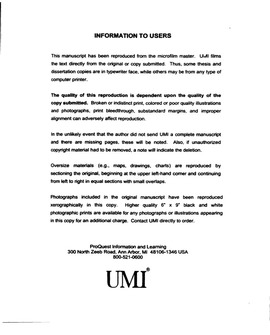| dc.contributor.advisor | Benson, Hugh, | en_US |
| dc.contributor.author | Stearman, Scott Lee. | en_US |
| dc.date.accessioned | 2013-08-16T12:18:29Z | |
| dc.date.available | 2013-08-16T12:18:29Z | |
| dc.date.issued | 2002 | en_US |
| dc.identifier.uri | https://hdl.handle.net/11244/424 | |
| dc.description.abstract | The monograph continues by looking at how these two streams emerge from one single---albeit complex---commitment to a proto-scientific commitment to the observance of nature. It is this consistent, coherent, and widely cast observational activity that forms the basis of the Xenophanean revolution. The fifth chapter is an attempt to demonstrate the continuity between the scientific methodology of Xenophanes and ours today. | en_US |
| dc.description.abstract | Initially the extant fragments relating to Xenophanes' epistemology or theology are translated with a brief commentary when a translation issue is paramount. Then a view of Xenophanes' epistemology is developed, based upon this textual exegesis and two millennia of scholarship. It is argued that Xenophanes is not the empiricist, rationalist, or sceptic that he is sometimes portrayed as being. Rather he best fits the model (indeed a mold he helped create) of a naturalistic fallibilist. | en_US |
| dc.description.abstract | Xenophanes was the first ancient Greek to make explicitly philosophical statements about epistemology. He was also the first Pre-Socratic to attack traditional and popular religion, eventually forming a rudimentary natural theology. This monograph attempts to show the clear connection and mutual dependency of these two streams of thought. In the process of this demonstration, however, it is necessary to give an interpretation of both streams. | en_US |
| dc.description.abstract | The same interpretive enterprise is attempted with his natural theology. A number of misunderstandings of Xenophanes' beliefs are laid aside and a "minimalist" vision of his theological convictions is developed. It is found that Xenophanes is not a committed monotheist, or monist, as has sometimes been taught. His philosophical razor trims excessive adumbrations and speculations, and trims theology of many of its traditional aspects. | en_US |
| dc.description.abstract | In the end Xenophanes appears to be quite influential. This document ends by showing the evident appreciation that Socrates held for this thinker. It was primarily through Socrates that Xenophanes would extend his formidable ideas through centuries of western civilization. | en_US |
| dc.format.extent | x, 168 leaves ; | en_US |
| dc.subject | Xenophanes, approximately 570 B.C.-approximately 478 B.C. | en_US |
| dc.subject | History, Ancient. | en_US |
| dc.subject | Philosophy, Ancient. | en_US |
| dc.subject | Theology. | en_US |
| dc.subject | Religion, Philosophy of. | en_US |
| dc.subject | Philosophy. | en_US |
| dc.title | The epistemic origins of Xenophanes' natural theology. | en_US |
| dc.type | Thesis | en_US |
| dc.thesis.degree | Ph.D. | en_US |
| dc.thesis.degreeDiscipline | Department of Philosophy | en_US |
| dc.note | Source: Dissertation Abstracts International, Volume: 63-01, Section: A, page: 0221. | en_US |
| dc.note | Adviser: Hugh Benson. | en_US |
| ou.identifier | (UMI)AAI3040840 | en_US |
| ou.group | College of Arts and Sciences::Department of Philosophy | |
